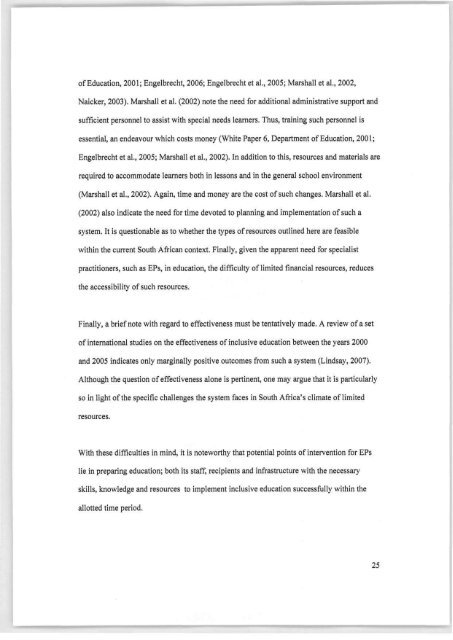Educational psychologists' perceptions of their role in the ...
Educational psychologists' perceptions of their role in the ...
Educational psychologists' perceptions of their role in the ...
You also want an ePaper? Increase the reach of your titles
YUMPU automatically turns print PDFs into web optimized ePapers that Google loves.
<strong>of</strong> Education, 2001; Engelbrecht, 2006; Engelbrecht et al., 2005; Marshall et al., 2002,<br />
Naicker, 2003). Marshall et al. (2002) note <strong>the</strong> need for additional adm<strong>in</strong>istrative support and<br />
sufficient personnel to assist with special needs learners. Thus, tra<strong>in</strong><strong>in</strong>g such personnel is<br />
essential, an endeavour which costs money (White Paper 6, Department <strong>of</strong> Education, 2001;<br />
Engelbrecht et al., 2005; Marshall et al., 2002). In addition to this, resources and materials are<br />
required to accommodate learners both <strong>in</strong> lessons and <strong>in</strong> <strong>the</strong> general school environment<br />
(Marshall et al., 2002). Aga<strong>in</strong>, time and money are <strong>the</strong> cost <strong>of</strong> such changes. Marshall et al.<br />
(2002) also <strong>in</strong>dicate <strong>the</strong> need for time devoted to plann<strong>in</strong>g and implementation <strong>of</strong> such a<br />
system. It is questionable as to whe<strong>the</strong>r <strong>the</strong> types <strong>of</strong> resources outl<strong>in</strong>ed here are feasible<br />
with<strong>in</strong> <strong>the</strong> current South African context. F<strong>in</strong>ally, given <strong>the</strong> apparent need for specialist<br />
practitioners, such as EPs, <strong>in</strong> education, <strong>the</strong> difficulty <strong>of</strong> limited f<strong>in</strong>ancial resources, reduces<br />
<strong>the</strong> accessibility <strong>of</strong> such resources.<br />
F<strong>in</strong>ally, a brief note with regard to effectiveness must be tentatively made. A review <strong>of</strong> a set<br />
<strong>of</strong> <strong>in</strong>ternational studies on <strong>the</strong> effectiveness <strong>of</strong> <strong>in</strong>clusive education between <strong>the</strong> years 2000<br />
and 2005 <strong>in</strong>dicates only marg<strong>in</strong>ally positive outcomes from such a system (L<strong>in</strong>dsay, 2007).<br />
Although <strong>the</strong> question <strong>of</strong> effectiveness alone is pert<strong>in</strong>ent, one may argue that it is particularly<br />
so <strong>in</strong> light <strong>of</strong> <strong>the</strong> specific challenges <strong>the</strong> system faces <strong>in</strong> South Africa's climate <strong>of</strong> limited<br />
resources.<br />
With <strong>the</strong>se difficulties <strong>in</strong> m<strong>in</strong>d, it is noteworthy that potential po<strong>in</strong>ts <strong>of</strong> <strong>in</strong>tervention for EPs<br />
lie <strong>in</strong> prepar<strong>in</strong>g education; both its staff, recipients and <strong>in</strong>frastructure with <strong>the</strong> necessary<br />
skills, knowledge and resources to implement <strong>in</strong>clusive education successfully with<strong>in</strong> <strong>the</strong><br />
allotted time period.<br />
25
















